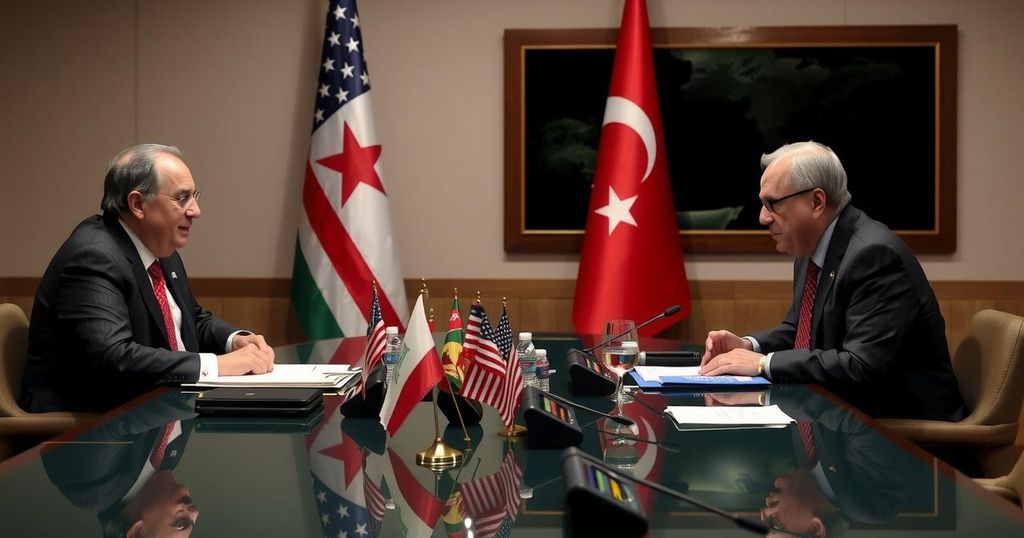Global news
AL - AQSA MARTYRS HOSPITAL, ANTONY BLINKEN, AP, ARAB LEAGUE, ASIA, ASSAD, BASHA, BASHAR ASSAD, CONFLICT, DEI, DEIR AL - BALAH, DIA, EUROPE/ASIA, EUROPEAN UNION, GAZA, GAZA HEALTH MINISTRY, GAZA STRIP, GAZA WAR, HAMAS, HEZBOLLAH, HUMANITARIAN CRISIS, INTERIOR MINISTRY, ISRAEL, JORDAN, MIDDLE EAST, MIDDLE EAST AFFAIRS, MINISTRY, NORTH AMERICA, PHILIPPINES, SYRIA, TURKEY, U. S, UNITED ARAB EMIRATES, UNITED NATIONS, UNITED STATES, US
Marcus Li
0 Comments
Diplomatic Discussions in Jordan Address Syria’s Transition Post-Assad
Top diplomats from the US, the Arab League, and Turkey met in Jordan to discuss Syria’s governance after Bashar Assad’s government fell. The talks raised concerns about regional stability, emphasizing the need for an inclusive government that respects rights and handles humanitarian crises. The reopening of Turkey’s embassy marked a significant diplomatic shift, reflecting changing alliances in the region.
Top diplomats from the United States, the Arab League, and Turkey convened in Jordan to deliberate on Syria’s transition following the recent downfall of Bashar Assad’s government. U.S. Secretary of State Antony Blinken participated in these critical discussions aimed at establishing a new framework for Syria’s leadership priorities. Notably absent were Syrian representatives, heightening concerns about regional stability amidst ongoing conflicts, including the Israel-Hamas situation in Gaza.
The collapse of Assad’s regime, which dominated Syria for over 50 years, raised fears of instability in the region, particularly in light of the current escalation of violence between Israel and Hamas. The humanitarian impact has been profound, with over 44,800 Palestinians reported dead in Gaza, alongside a stark humanitarian crisis affecting over two million people.
In a significant development, Turkey reopened its embassy in Syria, signifying its support for the new regime. This move follows the historical cutting of diplomatic ties in 2012, reflecting a shift in geopolitical relations. Turkish officials played a crucial role in assisting the insurgents during the Syrian civil conflict.
During the discussions in Aqaba, Secretary Blinken emphasized the necessity for the new Syrian government to be inclusive, safeguard minority and women’s rights, and facilitate the destruction of remaining chemical weapons stockpiles inherited from the Assad era. UN Special Envoy for Syria, Geir Pederson, echoed this sentiment, advocating for a credible political process that involves all Syrian communities.
The Jordanian Foreign Ministry confirmed that the meeting’s agenda included strategies to support a Syrian-led political process aimed at reconstruction of state institutions while ensuring the preservation of Syria’s unity and the rights of its citizens. This gathering represents a crucial step towards potentially stabilizing a region fraught with uncertainties and violence.
The context surrounding this article involves ongoing geopolitical tensions in the Middle East, particularly influenced by the recent fall of the Assad regime in Syria, which had been a significant player in the region for over five decades. The U.S., alongside international partners, is seeking to shape Syria’s future amidst a backdrop of heightened humanitarian crises due to conflicts involving Israel, Hamas, and the repercussions faced by the Palestinian population in Gaza. Diplomatic relations have been transforming, as evidenced by Turkey’s recent decision to reopen its embassy in Syria, marking a pivotal change in foreign relations within the region.
In summary, the gathering of diplomats from the United States, the Arab League, and Turkey in Jordan represents a strategic initiative to address the future governance of Syria following the end of Bashar Assad’s rule. The discussions highlighted the need for an inclusive political process, respect for human rights, and essential humanitarian assistance. Furthermore, the reopening of Turkey’s embassy indicates a shift in diplomatic relations, emphasizing the complexities and urgent nature of the situation in the Middle East.
Original Source: abcnews.go.com




Post Comment